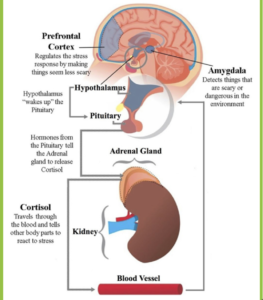
As we all know, our lives right now are quite stressful as we try to deal with the containment of COVID-19. Things are happening now that have never happened in some people’s lifetimes which can be scary and confronting. It’s normal to be anxious about a situation that you have never been exposed to before, but too much anxiety and stress can have detrimental effects on your immune system, leaving you prone to infection and sickness.
Stress is confusing and temperamental. Sometimes, it can be a motivator that helps you rise to the occasion. Other times, it can be overwhelming and exhausting. If your stress is chronic, it will have negative impacts on your health.
What happens when we stress?
The stress cycle begins with an “external stressor”, otherwise known as the trigger. This could be anything, from watching your favourite AFL team in a Grand Final to that snarky comment from your work colleague.
All your senses switch on to respond to this trigger by scanning for danger and assessing safety. This ability to know if the environment is safe or not is called neuroception and it happens without you knowing!
If your senses detect a threat, a signal is sent to the part of your brain, called the amygdala, which processes emotions. Once the amygdala is triggered, a signal is then sent to the hypothalamus and pituitary gland, two sections of the brain responsible for maintaining balance in your body. All of these sections communicate via the autonomic nervous system, the part of your nervous system that controls functions without your conscious awareness, e.g. heart rate, blood pressure etc.
When the hypothalamus and pituitary gland detect danger, the sympathetic nervous system is activated. This is the half of your autonomic nervous system that rules the “flight or fight” response. Stress hormones such as cortisol and adrenaline are released which stimulates the flight or fight response, resulting in excitation of your cardiovascular and musculoskeletal systems.
When your sympathetic nervous system is activated, the other half of your autonomic nervous system, the parasympathetic nervous system is suppressed as they both can’t be active at the same time. Your parasympathetic nervous system is responsible for the “rest and digest” functions of the body. The suppression of it results in your immune and digestive systems standing down.
Being stressed for a long period of time leaves your immune system suppressed for a long period of time. This can lead to frequent illness and infection as your body’s ability to fight off infection is largely diminished. Chronic stress also increases your risk of developing heart and digestive disorders.
How to de-stress
- Sleep
- Having a proper night’s sleep will leave you feeling refreshed in the morning and ready to attack the day. Introducing a regular, healthy sleep cycle has shown to have positive effects on productivity levels and your mindset.
- Exercise
- When you are physically active, your body releases mood-boosting chemicals called endorphins. Exercise does not only help you destress, it helps improve your physical state too. It lowers blood pressure, strengthens muscles and helps you maintain a healthy weight.
- Meditate
- Meditation or mindfulness techniques have been shown to reduce heart disease risk factors such as high blood pressure. Meditation also promotes deep breathing, another relaxation technique, which overall relaxes the mind and body.
- Disconnect
- Sometimes it’s good to just put your phone, computer or iPad away. This lets you escape all the problems that are happening in the world. Even if it is for just 10-15 minutes, distracting yourself can have a positive effect on your mindset.
- Do the things you love
- Enjoy life and make sure you are doing things you love doing. Doing this will introduce a feeling of satisfaction and will leave you with a smile on your face.
Dr. Tim Roberts
Ascot Vale Osteopathy
YOU MAY ALSO LIKE...
What’s Your Why?
Dr Chelsey Kedmenec explains why your Osteopath asks so many questions, and getting to know your Why.
Osteopathic treatment and management is not just about the issue... read moreWhy Does Your Osteopath Make You Walk Strangely? The Role of
Have you ever wondered why your osteopath asks you to walk back and forth while carefully observing your every step? We promise it’s not just for entertainment purposes or to make you feel self-conscious. Gait analysis is...
read moreOvertraining: Understanding the Causes, Effects, and Prevent
In the pursuit of fitness and athletic performance, it's important to strike a balance between training and recovery. Increasing training load when implemented correctly, with appropriate rest and recovery, yields great res...
read moreStrengthen Your Core
What is your core? Your core is a group of muscles that sit in your torso. They stabilise and control the pelvis and spine. When most people think of their core, they envision a chiseled 6-8 pack. Unfortunately, the core goes ...
read moreUnderstanding LDL Cholesterol: The Silent Culprit behind Car
In recent years, cardiovascular diseases have become a leading cause of morbidity and mortality worldwide. Among the numerous factors contributing to these conditions, LDL cholesterol has gained significant attention. LDL, or ...
read moreChronic pain: How pain catastrophising and fear of avoidance
Chronic pain syndrome is a complex multifactorial disease that affects 1 in 5 Australians over the age of 45. It is the third largest disease burden (surpassed by cancer and cardiovascular disease), and costs approximately ...
read moreHow can your Osteopath help your child?
Osteopathy is a holistic approach to the body that considers the interconnectedness of the body's muscles, joints and systems. Typically adults are the ones getting treated, but at Ascot Vale Osteopathy, we treat children f...
read moreManual Therapy and Exercise – A Recipe for Success
There have been plenty of times throughout history where Osteopath’s and other manual therapists have been called magicians. While we will always take this as a compliment, the matter of fact is, it’s not (entirely) tru...
read moreThe Benefits of Sleep that we never talk about
We always hear, “remember to get your 7 to 8 hours of sleep if you want to function”, yet no one is actually listening. Apart from wal...
read more
Share this news article online